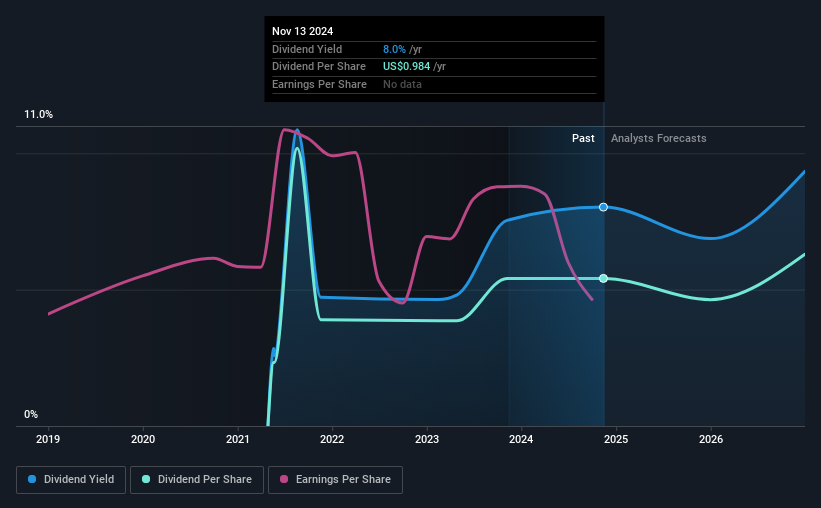- United States
- /
- Capital Markets
- /
- NasdaqGS:PAX
Here's Why We're Wary Of Buying Patria Investments' (NASDAQ:PAX) For Its Upcoming Dividend

Readers hoping to buy Patria Investments Limited (NASDAQ:PAX) for its dividend will need to make their move shortly, as the stock is about to trade ex-dividend. The ex-dividend date is usually set to be one business day before the record date which is the cut-off date on which you must be present on the company's books as a shareholder in order to receive the dividend. The ex-dividend date is important as the process of settlement involves two full business days. So if you miss that date, you would not show up on the company's books on the record date. This means that investors who purchase Patria Investments' shares on or after the 18th of November will not receive the dividend, which will be paid on the 9th of December.
The company's next dividend payment will be US$0.15 per share. Last year, in total, the company distributed US$0.98 to shareholders. Looking at the last 12 months of distributions, Patria Investments has a trailing yield of approximately 8.0% on its current stock price of US$12.26. Dividends are a major contributor to investment returns for long term holders, but only if the dividend continues to be paid. So we need to check whether the dividend payments are covered, and if earnings are growing.
View our latest analysis for Patria Investments
Dividends are usually paid out of company profits, so if a company pays out more than it earned then its dividend is usually at greater risk of being cut. An unusually high payout ratio of 219% of its profit suggests something is happening other than the usual distribution of profits to shareholders.
When a company pays out a dividend that is not well covered by profits, the dividend is generally seen as more vulnerable to being cut.
Click here to see the company's payout ratio, plus analyst estimates of its future dividends.

Have Earnings And Dividends Been Growing?
Companies with consistently growing earnings per share generally make the best dividend stocks, as they usually find it easier to grow dividends per share. Investors love dividends, so if earnings fall and the dividend is reduced, expect a stock to be sold off heavily at the same time. This is why it's a relief to see Patria Investments earnings per share are up 2.5% per annum over the last five years.
Another key way to measure a company's dividend prospects is by measuring its historical rate of dividend growth. In the last three years, Patria Investments has lifted its dividend by approximately 32% a year on average. It's encouraging to see the company lifting dividends while earnings are growing, suggesting at least some corporate interest in rewarding shareholders.
Final Takeaway
From a dividend perspective, should investors buy or avoid Patria Investments? While we like that its earnings are growing somewhat, we're not enamored that it's paying out 219% of last year's earnings. Patria Investments doesn't appear to have a lot going for it, and we're not inclined to take a risk on owning it for the dividend.
Although, if you're still interested in Patria Investments and want to know more, you'll find it very useful to know what risks this stock faces. To help with this, we've discovered 3 warning signs for Patria Investments (1 shouldn't be ignored!) that you ought to be aware of before buying the shares.
Generally, we wouldn't recommend just buying the first dividend stock you see. Here's a curated list of interesting stocks that are strong dividend payers.
New: Manage All Your Stock Portfolios in One Place
We've created the ultimate portfolio companion for stock investors, and it's free.
• Connect an unlimited number of Portfolios and see your total in one currency
• Be alerted to new Warning Signs or Risks via email or mobile
• Track the Fair Value of your stocks
Have feedback on this article? Concerned about the content? Get in touch with us directly. Alternatively, email editorial-team (at) simplywallst.com.
This article by Simply Wall St is general in nature. We provide commentary based on historical data and analyst forecasts only using an unbiased methodology and our articles are not intended to be financial advice. It does not constitute a recommendation to buy or sell any stock, and does not take account of your objectives, or your financial situation. We aim to bring you long-term focused analysis driven by fundamental data. Note that our analysis may not factor in the latest price-sensitive company announcements or qualitative material. Simply Wall St has no position in any stocks mentioned.
About NasdaqGS:PAX
Patria Investments
Operates as a private market investment firm focused on investing in Latin America.
High growth potential with adequate balance sheet.


